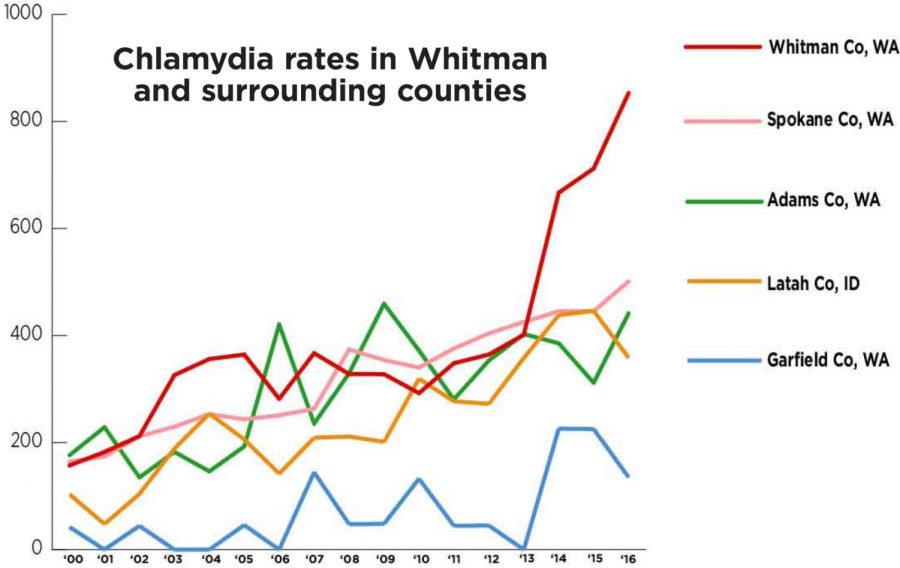STD rates continue to rise locally, county says
Chlamydia, gonorrhea numbers may increase as more cases reported
April 17, 2018
Whitman County is seeing increased rates of the most common sexually transmitted diseases, according to new health department data.
Recorded cases of chlamydia and gonorrhea increased in Whitman County in 2017, according to a Whitman County Department of Public Health news release. Chlamydia increased by 8 percent last year and gonorrhea by 142 percent.
Deanna Claybaugh, a community health nurse with the health department, said the increases — particularly the sharp spike in gonorrhea — do not necessarily mean more people in the area are contracting STDs.
“There could be a number of reasons for why we’re seeing more cases. It could be that more people are being tested,” Claybaugh said. “If more people are being tested, you could be getting higher numbers. We’re encouraging more people to get tested.”
There were 411 reported cases of chlamydia in Whitman County in 2016, which was 68 more than the year before, according to data from the Centers for Disease Control and Prevention. There were 15 reported cases of gonorrhea in the county last year, according to the data, up from nine in 2015 and 13 in 2014. Whitman County had the highest rates of both diseases in Eastern Washington.
There are several places in Pullman that WSU students can get tested. Health & Wellness Services on campus conducts screenings, as does Planned Parenthood in Pullman. Students might have to be prepared to spend some money, though. Kristen Maki, the communications coordinator for health promotion, explained the costs associated with testing.
“There isn’t one single panel of STI tests that covers everything,” Maki wrote in an email, “so costs depend on what test[s] the provider orders.”
She said the tests for both chlamydia and gonorrhea cost about $125. Students without insurance can apply for financial assistance, she said, which cuts the cost in half.
Maki said the costs of getting tested depends on the individual plan.
While Planned Parenthood does not have a financial assistance program like Health & Wellness Services, they are able to set up payment plans and work with people individually. An STD test could range from $75-$300, according to an estimate from their billing department. If the balance is paid in full the same day, however, Planned Parenthood can offer a 35-percent discount.
Testing may be expensive, but it is necessary, Claybaugh said. She recommends annual screenings for people engaging in sexual activities.
“People think that they don’t have it because they are asymptomatic,” Claybaugh said. “Most people who test positive have no symptoms at all.”
She said leaving an STD untreated can wreak havoc. According to the CDC, long-term untreated syphilis, also known as tertiary syphilis, can lead to neurological damage in the form of blindness, deteriorated motor skills and dementia. Syphilis is far rarer, however, with fewer than 10 reported cases in 2016 in Whitman County, according to CDC data.
Claybaugh said decreasing high-risk behavior, using condoms consistently and getting tested regularly are all preventative measures people can take to maintain their sexual health.











